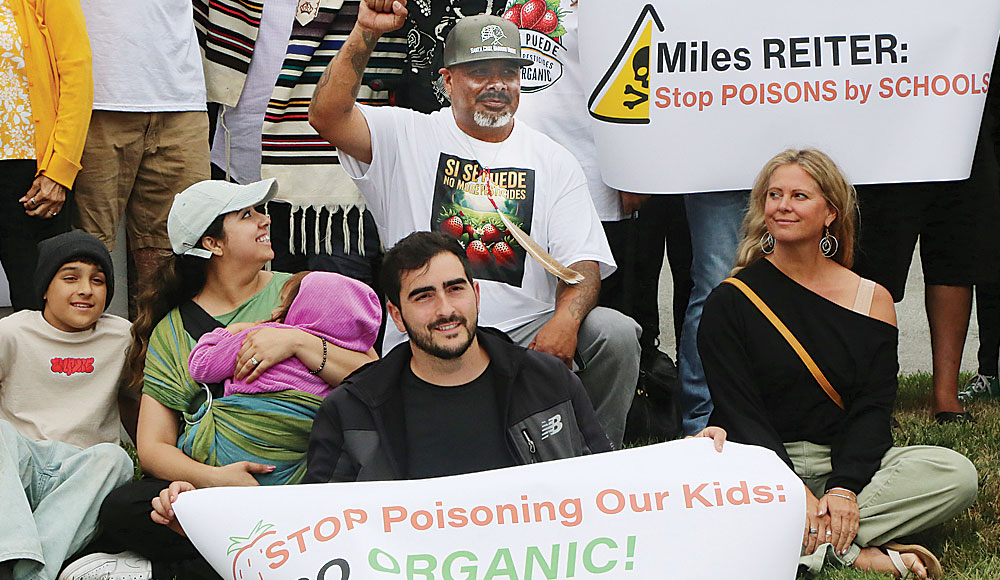Watsonville activist Omar Dieguez and a group of community leaders announced a hunger strike and started the movement with a protest outside of Driscoll’s headquarters in Watsonville on Sept. 2.
About 50 people were protesting the use of toxic pesticides near homes and schools in Watsonville and the Pajaro Valley.
Dieguez announced that he began his fast on Sept. 1 and will continue for 30 days. He is being joined by several community leaders who will fast for various lengths of time.
Dieguez released a public statement to Driscoll’s and California Giant Berry owners, urging them to transition their fields near homes and schools to organic and stopping the use of toxic pesticides.
“Enough is enough,” the statement reads. “For too long, you have poisoned our community with toxic pesticides that harm our farmworkers, our immigrant and Indigenous families, our youth, and all of Pajaro Valley. You are contaminating our water, our land, our oceans, and the very air we breathe. This must stop now.”
Dieguez says in the statement that, as a young boy growing up near the fields, he acquired acute asthma.
“Many of my friends have suffered from cancers and other health problems that many of the same chemicals used in your berry fields are known to cause,” he says.
Dieguez says that the companies have the resources and capabilities to end pesticide use immediately and transition to safer practices.
“Impacts from pesticides go on for decades,” Gabe Medina, Pajaro Valley Unified School District board member, told the crowd. He spoke of family members who were sprayed “directly” while working area fields, and of cancer and strokes that have affected his family.
“This is what pesticides do to us: They impact us physically and mentally,” Medina said. He demanded proper screening of students at schools for added protection and spoke strongly of area leaders coming forward and standing up for what is right “and challenging corporations that see us as disposable units in order for them to make profits.”
Adam Scow of Campaign for Organic and Regenerative Agriculture, a grassroots organization of residents of the Monterey Bay, stated: “Local activists are coming together to put their bodies on the line in support of the movement to stop toxic pesticides. Our region is actually a leader in organic agriculture with nearly 20 percent of the Pajaro Valley being organic. So we need more of it in the right places.”
The specific fields near Pajaro Valley homes and schools are illustrated on a map released by the Campaign for Organic & Regenerative Agriculture, available at farmworkerfamily.org/cora.
In a prepared statement from Driscoll’s, the 150-year-old company says its “roots in this community run deep.”
“We live here, work here, send our children to local schools, and care deeply about the health and safety of our families, employees, and neighbors,” the statement reads.
The use of pesticides—and their use near schools—is regulated and monitored by agencies such as the U.S. Environmental Protection Agency (EPA), the California Department of Pesticide Regulation (CDPR) and the County Agricultural Commissioner’s Offices.
“All of Driscoll’s independent growers are required to follow regulations and the law, working with government agencies to ensure full compliance,” the statement says. In addition, all pesticides must be approved by EPA and CDPR, and are reviewed and approved only after scientific evaluation for safety.
CDPR is responsible for monitoring pesticides in the air, surface water and groundwater, as well as new scientific information.
The issue of buffer zones—and when to update them—lies under the authority of agencies like the EPA and CDPR, the Driscoll’s statement asserts, and anyone who believes the rules need to be changed should contact the appropriate agencies, where they can be formally reviewed and addressed.
Driscoll’s is “committed to advancing certified organic farming beyond compliance,” the statement asserts.
“We believe the future of farming lies in collaborative innovation,” it reads. “That’s why one of our key initiatives is “More Berries, Less Resources.” Through that initiative, the company is collaborating with institutions such as UC Santa Cruz and Cal Poly San Luis Obispo to develop non-chemical solutions for pest and disease management.
Driscoll’s researchers are also developing berry genetics to breed naturally resilient plants that require fewer pesticide applications.
“These advances take time, research, and investment. But we are committed to leading the way toward more sustainable farming practices,” the statement says.












Thank you for your protest. I never buy nor accept berries that are not organic. Educating people to not buy sparyed berriess may be another way to go because boycotting works.
I met with Omar Dieguez this week at our Watsonville Cabrillo HSI science fair . he looks well and has now gone without food for many days. Omar is following in the footsteps of CAESAR CHAVEZ.
We need to respect Omar and his crusade against horrific chemicals that are sprayed on children and senior in Watsonville , not to mention much of CA where crops are grown.
DO NOT EAT SPRAYED PRODUCE. IT IS A CANCER RISK. TELL MR, BIG BUCKS DRISCOLL TO TURN ALL HIS FIELDS TO ORGAINC FARMING. yes, it IS a matter of life or death.